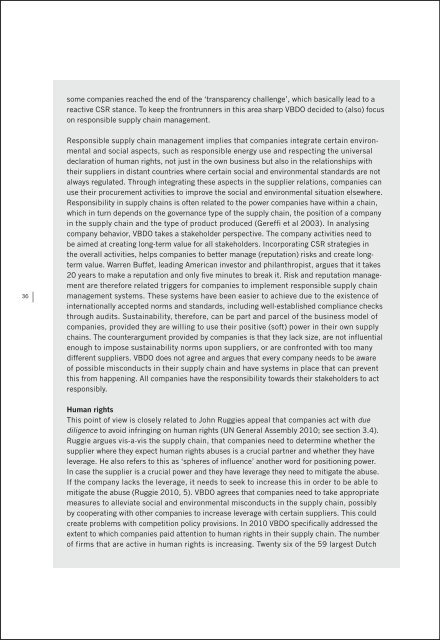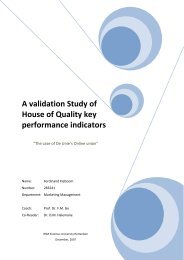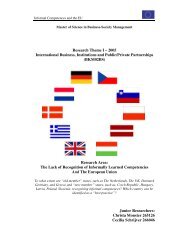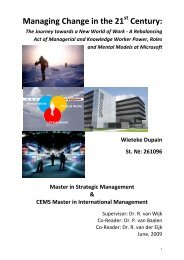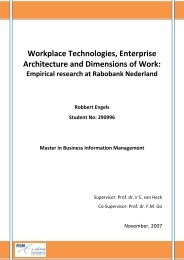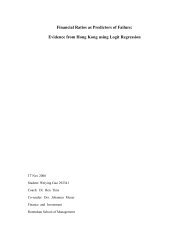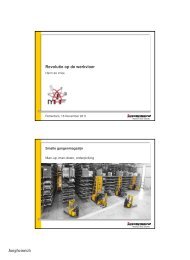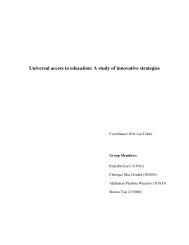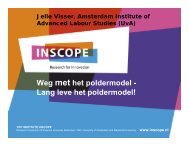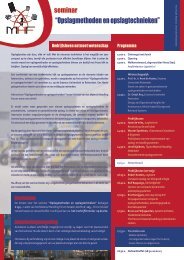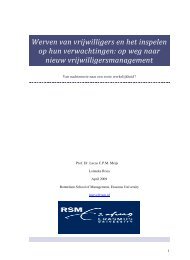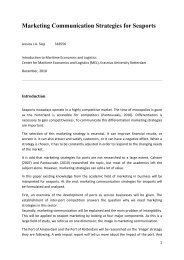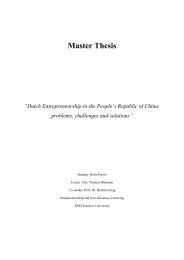Download With great power comes great responsibility (pdf) - ERIM
Download With great power comes great responsibility (pdf) - ERIM
Download With great power comes great responsibility (pdf) - ERIM
Create successful ePaper yourself
Turn your PDF publications into a flip-book with our unique Google optimized e-Paper software.
36<br />
some companies reached the end of the ‘transparency challenge’, which basically lead to a<br />
reactive CSR stance. To keep the frontrunners in this area sharp VBDO decided to (also) focus<br />
on responsible supply chain management.<br />
Responsible supply chain management implies that companies integrate certain environ -<br />
mental and social aspects, such as responsible energy use and respecting the universal<br />
declaration of human rights, not just in the own business but also in the relationships with<br />
their suppliers in distant countries where certain social and environmental standards are not<br />
always regulated. Through integrating these aspects in the supplier relations, companies can<br />
use their procurement activities to improve the social and environmental situation elsewhere.<br />
Responsibility in supply chains is often related to the <strong>power</strong> companies have within a chain,<br />
which in turn depends on the governance type of the supply chain, the position of a company<br />
in the supply chain and the type of product produced (Gereffi et al 2003). In analysing<br />
company behavior, VBDO takes a stakeholder perspective. The company activities need to<br />
be aimed at creating long-term value for all stakeholders. Incorporating CSR strategies in<br />
the overall activities, helps companies to better manage (reputation) risks and create longterm<br />
value. Warren Buffet, leading American investor and philanthropist, argues that it takes<br />
20 years to make a reputation and only five minutes to break it. Risk and reputation manage -<br />
ment are therefore related triggers for companies to implement responsible supply chain<br />
management systems. These systems have been easier to achieve due to the existence of<br />
internationally accepted norms and standards, including well-established compliance checks<br />
through audits. Sustainability, therefore, can be part and parcel of the business model of<br />
companies, provided they are willing to use their positive (soft) <strong>power</strong> in their own supply<br />
chains. The counterargument provided by companies is that they lack size, are not influential<br />
enough to impose sustainability norms upon suppliers, or are confronted with too many<br />
different suppliers. VBDO does not agree and argues that every company needs to be aware<br />
of possible misconducts in their supply chain and have systems in place that can prevent<br />
this from happening. All companies have the <strong>responsibility</strong> towards their stakeholders to act<br />
responsibly.<br />
Human rights<br />
This point of view is closely related to John Ruggies appeal that companies act with due<br />
diligence to avoid infringing on human rights (UN General Assembly 2010; see section 3.4).<br />
Ruggie argues vis-a-vis the supply chain, that companies need to determine whether the<br />
supplier where they expect human rights abuses is a crucial partner and whether they have<br />
leverage. He also refers to this as ‘spheres of influence’ another word for positioning <strong>power</strong>.<br />
In case the supplier is a crucial <strong>power</strong> and they have leverage they need to mitigate the abuse.<br />
If the company lacks the leverage, it needs to seek to increase this in order to be able to<br />
mitigate the abuse (Ruggie 2010, 5). VBDO agrees that companies need to take appropriate<br />
measures to alleviate social and environmental misconducts in the supply chain, possibly<br />
by cooperating with other companies to increase leverage with certain suppliers. This could<br />
create problems with competition policy provisions. In 2010 VBDO specifically addressed the<br />
extent to which companies paid attention to human rights in their supply chain. The number<br />
of firms that are active in human rights is increasing. Twenty six of the 59 largest Dutch<br />
publicly listed companies explicitly mentioned their efforts to ensure human rights in their<br />
business practices. Seventeen incorporated respect for human rights in their contracts with<br />
suppliers. This is an increase compared to 2009 when only fourteen companies explicitly<br />
mentioned to respect human rights. So, although an issue like human rights is gaining more<br />
attention, the challenge remains to indeed conduct due diligence and look beyond the direct<br />
suppliers for human right abuses further down the supply chain. VBDO would like companies<br />
to take their <strong>responsibility</strong> and work together with different actors in the supply chain to<br />
improve the human rights situation around the world. The latter would represent a more<br />
(pro)active approach which is still lacking.<br />
Anne van Lakerveld<br />
Mainstream institutional investors in frontrunner European countries, like the Netherlands or Norway,<br />
have also started to become more vocal in their plea for more sustainability in the companies they<br />
invest in. The market share for sustainable investment in the Netherlands is around 4% (VBDO,<br />
2010). However, investment funds apply primarily negative criteria as well for their own investment<br />
portfolio. A prominent example is the Norwegian government pension fund – Global. The fund’s<br />
Advisory Council on Ethics was established in November 2004, following a new regulation that<br />
required the management of this government fund to include also ethical guidelines. <strong>With</strong>in five<br />
years, the fund has excluded around 42 major multinational enterprises, including such well known<br />
companies as Wal-Mart, Altria, BAT, Honeywell, Northrop, Philip Morris and Rio Tinto. The reasons for<br />
divestments are slightly broader than in the Anglo-Saxon countries, which has made Global a force<br />
towards a more active sustainability approach of companies. On the whole, however, the prime<br />
reasons for divestment remain tobacco (17/42); military including production of cluster ammunition<br />
(18/42); 5 environmental damage (5/42) and human rights violations (4/42).<br />
On 19 January 2010 the Ministry of Finance announced that 17 tobacco companies had been excluded<br />
from the fund. The total divestment from these companies was USD 2bn (NOK 14.2bn), making it the<br />
largest divestment caused by ethical recommendations in the history of the fund. Three previously<br />
excluded companies (because of environmental damage and cluster ammunition) were reinstated due<br />
to changed strategies. More than 80% of the screening thus is primarily based on the sector companies<br />
are in, not on other positioning and strategic decisions. Comparable discussion appeared in other<br />
countries. When pension funds in the Netherlands were accused of investing in companies that<br />
produced ‘cluster bombs’ they withdrew their investments. But in other areas they remain relatively<br />
inactive, without an opinion – neither critical nor supportive – of transition trajectories towards more<br />
sustainable business practices, which re-inforces the negative duty approach of public companies.<br />
37


